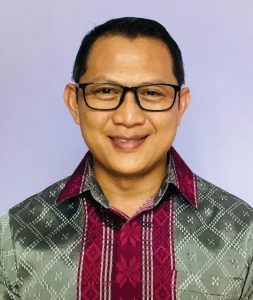Research Dissemination Beyond Academic Publications - Sponsored by the Asia Chapter
The ultimate goal of the development of knowledge is to improve the society. In order for that to take place, we need evident-based policy, crafted through the involvement of science and technology. In short, a good policy has to be knowledge-based. Having said this, academics and researchers have to ensure that knowledges they have produced through systematic academic process are well taken into account in a policy making. In other words, new knowledges have to be accessible by policy makers. On the other hands, consuming quality works in academic publications such as academic journals, and conference proceedings is generally not the habit of policy makers, for one reason or two. Hence, dissemination of new knowledge only through academic publications is inadequate for the new knowledge to reach policy makers. This talk explores possibilities of academic research to be disseminate through various media beyond academic publications to reach greater audiences, including particularly policy makers. It will start by illustrating the journey of data transforming into information to form knowledge and then play important roles in policy making. The change of people’s behaviour in securing information amid the flood of information through the emergence of alternative media will also be highlighted. Having explored the aforementioned, the talk will offer insights on how academics and researchers need to adapt to ensure that the knowledge they have produced can maintain their roles in policy making. Disseminating their findings and knowledge beyond academic publications such as social and other popular media will be presented. Instead of focusing on theoretical aspects, the presenter will share his reasonably extensive experience in using social media in disseminating academic contents. He will also share relevant strategies and approaches, highlight advantages and disadvantages, and provide some lessons learnt for audiences as references.
Learning Objectives:
1. Revisiting the principle of evident-based policy making and the roles of scientific research behind it
2. Understanding different channels for dissemination of scientific findings and their respective advantages and disadvantages
3. Understanding appropriate strategies and approach in the utilisation of social and other popular media in disseminating research findings beyond academic publications.
Presenters
 I Made Andi Arsana is an Indonesian Academic from UGM. His recent assignment was attending the invitation from the Chinese Government to share his ideas and views about regional interaction in various institutions in China including Fudan University, Shanghai Institute for International Studies, Xi’an Jiaotong University, Xi’an International Studies University, NIIS CASS, and Peking University. His visit was also to learn the latest development in China and its relevance in the region. Earlier this year, Andi was invited to Melbourne, Australia to participate in the ASEAN-Australia Maritime Summit in commemoration of 50 th Anniversary of ASEAN-Australia relationship. Andi was tasked as one of the panellists for the Indonesian Presidential Candidate Debate of 2024. Andi has extensively published his works in the area of geospatial aspects of the law of the sea, especially maritime boundaries. Andi has been actively utilising social media in disseminating his research findings and ideas in general. He has more than 400K followers in different platform including Instagram, TikTok, YouTube, Facebook, etc. He found that through social media, his ideas and findings found their way easier to policy makers in Indonesia and the region. Due to his active contribution through popular media, for example, Andi has been asked to give lectures and talks in different countries in Asia, America, Oceania, Europe, and Africa. Andi believes that scientific contents should find their ways to their readers through various ways. With his approach, Andi wants to makes sure that his works are scientifically popular and popularly scientific.
I Made Andi Arsana is an Indonesian Academic from UGM. His recent assignment was attending the invitation from the Chinese Government to share his ideas and views about regional interaction in various institutions in China including Fudan University, Shanghai Institute for International Studies, Xi’an Jiaotong University, Xi’an International Studies University, NIIS CASS, and Peking University. His visit was also to learn the latest development in China and its relevance in the region. Earlier this year, Andi was invited to Melbourne, Australia to participate in the ASEAN-Australia Maritime Summit in commemoration of 50 th Anniversary of ASEAN-Australia relationship. Andi was tasked as one of the panellists for the Indonesian Presidential Candidate Debate of 2024. Andi has extensively published his works in the area of geospatial aspects of the law of the sea, especially maritime boundaries. Andi has been actively utilising social media in disseminating his research findings and ideas in general. He has more than 400K followers in different platform including Instagram, TikTok, YouTube, Facebook, etc. He found that through social media, his ideas and findings found their way easier to policy makers in Indonesia and the region. Due to his active contribution through popular media, for example, Andi has been asked to give lectures and talks in different countries in Asia, America, Oceania, Europe, and Africa. Andi believes that scientific contents should find their ways to their readers through various ways. With his approach, Andi wants to makes sure that his works are scientifically popular and popularly scientific.
Can't join a webinar at its scheduled time? Don't worry!
All webinar registrants will receive a link to the webinar recording after the event. All ASIS&T webinar recordings are also available for on-demand viewing from the Past Webinar Library on iConnect, the online community for ASIS&T members. If you need help accessing iConnect, contact Pamela Yonker at pyonker@asist.org.
